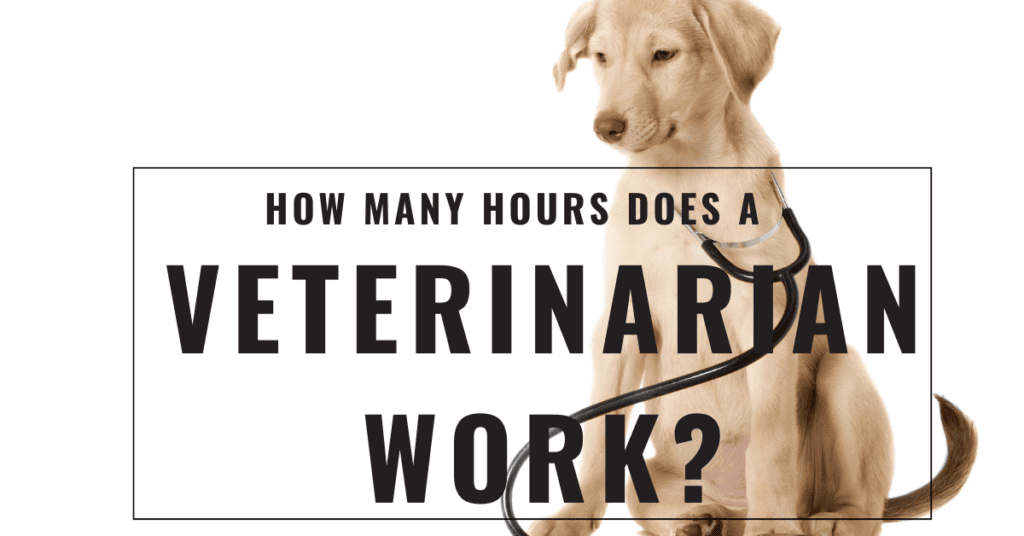If you want to become a veterinarian, you might wonder how many hours you’ll work. Veterinarians are responsible for animals’ health, care, and well-being, and their work can be physically and emotionally demanding. The hours they work can vary depending on their specialty, practice type, and personal preferences.
In general, veterinarians work long hours, often including weekends and holidays. Many work more than 40 hours per week, with some working up to 60 or more.
The longer hours are because animals require care around the clock, and emergencies can happen anytime. Veterinarians must prepare to work long hours and be available to their patients when needed.
Understanding the Veterinarian Profession
If you’re considering a career as a veterinarian, it’s essential to understand this profession’s demanding role and responsibilities. Veterinarians are medical doctors who diagnose and treat diseases and injuries in animals.
Veterinarians also graduate with a high amount of student debt, so many may choose to work long hours to offset this student loan payment.
They also provide preventative care, such as vaccinations and wellness exams, and may perform surgeries and other medical procedures.
Role and Responsibilities
As a veterinarian, you can choose to work with whatever type of animal you like, from household pets to livestock to exotic species. Your day-to-day responsibilities may include:
- Conducting physical exams and medical tests
- Diagnosing illnesses and injuries
- Prescribing medications and treatments
- Performing surgeries and other medical procedures
- Providing preventative care, such as vaccinations and deworming
- Educating pet owners on proper care and nutrition
- Providing end of life care
- Keeping detailed medical records
In addition to clinical work, veterinarians may work in research, public health, or other fields. Some veterinarians specialize in a particular area of animal medicine, such as surgery, dentistry, or cardiology.
Veterinarians typically work long hours, often including weekends and evenings. Animals may require Emergency care at any time, so flexibility is essential in this profession. However, many veterinarians find the work rewarding and fulfilling, as they can help animals and their owners daily.
Types of Veterinarians and Their Working Hours

If you’re considering a career as a veterinarian, it’s essential to understand the different types of veterinarians and their working hours. Many veterinarians with a DVM/MPH may work for a college or laboratory where the hours are not so crazy. Here are some examples:
Emergency Veterinarian Working Hours
Emergency veterinarians work in animal hospitals that are open 24/7. They may work overnight, on weekends, and holidays. Their schedules can be unpredictable, as they must be available to respond to emergencies anytime.
Large Animal Veterinarian Working Hours
Large animal veterinarians typically work in rural areas and may be on call 24/7. Their schedules can be long and physically demanding, as they often have to travel to farms and ranches to care for animals.
Vet That Owns A Practice
Veterinarians who own their practice have more control over their schedules. However, they may work long hours to ensure their practice is thriving. They may also be on call for emergencies.
Paid Employee At A Regular Veterinary Clinic
Veterinarians who work as paid employees at a regular veterinary clinic typically work normal business hours. They may work evenings and weekends to accommodate clients’ schedules.
Laboratory Veterinarian
Laboratory veterinarians typically work in research facilities or pharmaceutical companies. They may work regular business hours but may also work long hours during experiments or clinical trials.
Veterinary Radiologist’s Work Hours
A veterinary radiologist’s work typically occurs during standard business hours, as they must be available to consult with other veterinarians. They usually work a full-time schedule of 40 hours per week, which can sometimes work out to 3-5 days per week.
However, some may work more than 40 hours per week and have to work nights or weekends, especially in emergencies.
In specific settings like referral specialty hospitals, the business hours might extend past 7 am – 6 pm and include weekends. Some facilities offer veterinary diagnostic imaging services from 8 am to 6 pm, Monday through Friday, with emergency radiology, CT, and ultrasound available anytime.
In the case of telemedicine roles, the radiologist may have more flexible hours as they evaluate X-rays, Ultrasound, MRIs, and Computed Tomography remotely.
Zoo Veterinarian
Zoo veterinarians often work more than the standard 40-hour work week. Some sources suggest that many work up to 50 hours or more weekly. They may also be on call for emergencies, such as a new animal arriving at the zoo or a disease outbreak.
However, the work-life balance can vary. While most vets work full-time, there is a significant variation in how and where they spend their time.
For instance, some may have to work nights and weekends or respond to emergencies outside of regular working hours. Additionally, zoo veterinary technicians may be required to work weekends, holidays, some evenings, and generally beyond scheduled work hours.
Overall, the job can be physically challenging with irregular hours, and the salaries can often be lower compared to private practice, mainly because many zoos are charities.
Despite these challenges, many find the work rewarding due to their passion for animals. Learn more about how to become a zoo vet.
Shelter Veterinarian Working Hours
Shelter veterinarians work in animal shelters and may work irregular hours. They may work weekends and holidays to care for animals and be on call for emergencies.
As you can see, the working hours of veterinarians can vary greatly depending on their specialty. It’s essential to consider your lifestyle and personal preferences when choosing a career path in veterinary medicine.
Veterinarian Working Hours
As a veterinarian, your working hours can vary depending on several factors. This section will discuss the average weekly hours and the aspects influencing working hours.
Average Weekly Hours
On average, a veterinarian works around 40 hours per week. However, this can vary depending on the type of practice you work in.
For example, if you work in a small animal clinic, you may work fewer hours than in an extensive animal practice. On the other hand, you may need to work longer hours at a small clinic because there are not enough staff to cover emergencies.
Additionally, emergency veterinarians may work longer hours, including nights and weekends.
Factors Influencing Working Hours
Several factors can influence the number of hours you work as a veterinarian. These include:
- Type of practice: As mentioned earlier, the kind of practice you work in can impact your working hours. Small animal clinics typically have more regular hours, while large animal practices may require more extended hours and on-call work.
- Location: The location of your practice can also impact your working hours. In rural areas, you may work longer hours due to the need for more available veterinarians.
- Experience: Experienced veterinarians may have more control over their working hours and may be able to negotiate a more flexible schedule.
- Specialization: If you specialize in a particular area, such as surgery or emergency care, you may work longer hours or be on-call more frequently.
It’s important to note that while veterinarians may work long hours, it can also be a rewarding profession. You have the opportunity to help animals and make a positive impact on their lives.
Comparison with Other Professions
When considering the hours worked by veterinarians, it can be helpful to compare their schedules to those of other professions. How Many Hours Does a Veterinarian Work? Here are a few comparison examples:
- Physicians: Depending on their specialty, physicians may work longer than veterinarians. For example, surgeons may work 60-80 hours per week, while primary care physicians work 40-60 hours per week.
- Nurses: Nurses may work 8-12 hour shifts, with some working longer hours or overnight shifts. However, they may have more flexible schedules and may be able to work part-time or per diem.
- Dentists: Like veterinarians, dentists typically work regular business hours, although some may work evenings or weekends to accommodate patients. However, dentists may have more control over their schedules and can take extended time off for vacations or continuing education.
- Lawyers: Lawyers may work long hours, especially when preparing for trials or working on complex cases. However, some may have more control over their schedules and can sometimes work from home.
While veterinarians may work long hours at times, their schedules are generally comparable to those of other professions regarding regular business hours and flexibility.
Impact on Personal Life
As a veterinarian, your job can significantly impact your personal life. The long hours and unpredictable schedules can make maintaining a work-life balance and caring for your health challenging. Remember that there are many other jobs with animals that aren’t vets.
Work-Life Balance – How Many Hours Does a Veterinarian Work?
Working as a veterinarian often means long hours and irregular schedules. You may be required to work weekends, holidays, and even overnight shifts. This career can make planning social activities or spending time with family and friends difficult. But it doesn’t have to be that way if you set boundaries.
To maintain a healthy work-life balance, you’ll want to prioritize self-care and set boundaries. This may mean scheduling time off in advance, delegating tasks when possible, and learning to say no to additional work responsibilities.
Health Implications – How Many Hours Does a Veterinarian Work?
The demands of being a veterinarian can also take a negative toll on your mental health. Long hours on your feet, handling animals, euthanasia, and performing surgeries can lead to physical/mental strain and injuries.
Additionally, the emotional toll of dealing with sick or injured animals and difficult clients can cause stress, anxiety, and burnout.
To stay healthy, it’s important to prioritize self-care. Self-care may mean taking breaks throughout the day, practicing stress-reducing techniques like meditation or exercise, and seeking support from colleagues or a mental health professional.
In summary, being a veterinarian is immensely satisfying; however, focusing on your health and welfare is crucial to ensure a balanced lifestyle between work and leisure.
Final Thoughts for How Many Hours Does a Veterinarian Work?
In conclusion, being a veterinarian can be a demanding but rewarding career. The number of hours you work will depend on various factors, including your specialty, employer, and personal preferences. However, most veterinarians work full-time, with some working longer hours or being on call for emergencies.
It’s essential to remember that being a veterinarian requires significant education, training, and a passion for working with animals. Learn more about how long it takes to become a veterinarian.
If you’re considering a career in a demanding field like veterinary medicine, it’s essential to research and ensure it’s the right fit for you.
Overall, being a veterinarian can be a fulfilling and challenging career that allows you to make a difference in the lives of animals and their caretakers.



